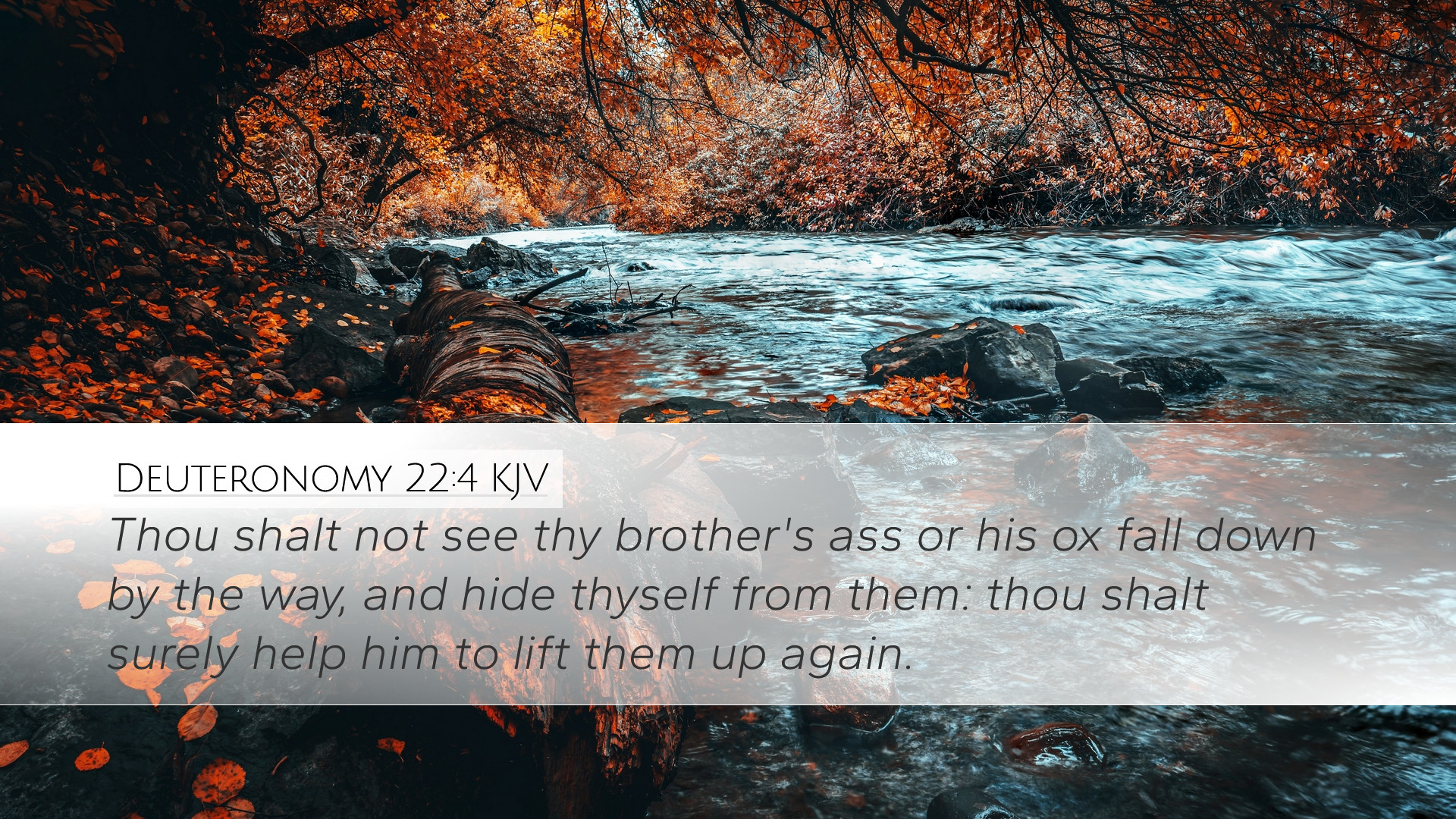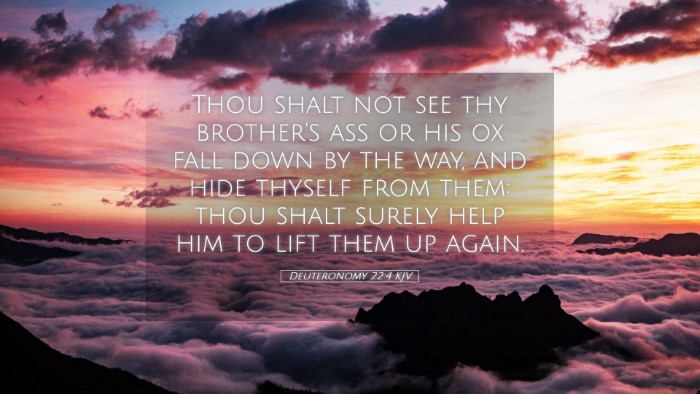Commentary on Deuteronomy 22:4
Verse: "Thou shalt not see thy brother's ass or his ox fall down by the way, and hide thyself from them: thou shalt surely help him to lift them up again."
Introduction
Deuteronomy 22:4 presents a vital moral principle woven into the fabric of the Law given to Israel. The verse emphasizes the duty of compassion and assistance to others, specifically in times of need. This brief yet profound command encapsulates the essence of brotherly love and responsibility.
Exegesis of the Passage
In this verse, the Hebrew terms employed convey not only a physical action but a deeper ethical obligation. The text refers to "thy brother," which denotes a familial or communal tie among the people of Israel. The “ass” or “ox” symbolizes not merely livestock but represents the livelihood and sustenance of one's neighbor. The act of "hiding" suggests a deliberate disengagement from the responsibility one bears towards others in the community.
Insights from Matthew Henry
Matthew Henry emphasizes the moral implications of this verse, illustrating that it reflects a broader principle of love and societal obligation. He notes, "It is a sin against the law of charity to be unconcerned in the misfortunes of our neighbor." Henry underscores that the command to help goes beyond physical action; it is a reflection of the heart's condition toward others. Furthermore, Henry relates this to the principle of treating others as we would like to be treated, aligning with the greater law of love encapsulated in the New Testament (Matthew 7:12).
Insights from Albert Barnes
Albert Barnes elaborates on the practicalities of assisting a neighbor in need. He states, "This command implies that we have a duty to our neighbor in all aspects of life, especially regarding their welfare." Barnes highlights that this verse calls for action, urging individuals to not be passive observers of misfortune. The underlying principle echoes throughout Scripture: the necessity of active love and support within the community, suggesting that faith in action manifests in tangible service to one another.
Insights from Adam Clarke
Adam Clarke delves into the cultural and historical context of the verse, pointing out that the loss or distress of a neighbor’s livestock represented a significant loss in agrarian society. He indicates that this commandment teaches "the necessity of brotherly cooperation in our social dealings." Clarke connects this social responsibility to a covenant relationship among God’s people, suggesting that genuine faith expresses itself in attending to one another’s burdens, which aligns with Galatians 6:2: "Bear ye one another's burdens, and so fulfill the law of Christ."
Theological Reflections
From a theological perspective, Deuteronomy 22:4 highlights the interconnectedness of the community of faith. It emerges as a testament to God's design for communal living, wherein the well-being of one is intricately tied to the well-being of all. The call to help and not hide resonates with the New Testament teachings of Jesus, particularly in the parable of the Good Samaritan (Luke 10:25-37), which reinforces the idea that mercy and compassion transcend social boundaries.
Application for Pastors and Theologians
This verse offers profound application for contemporary church leadership and theological reflection. Pastors can draw upon this principle to foster a culture of active compassion within their congregations. The message encourages believers to engage with their communities and respond actively to those in need, thereby imitating Christ’s love.
- Encouraging Service: Leaders should promote and model active service within the church, urging members to be proactive and to support one another.
- Community Engagement: Churches can implement outreach programs that embody this command, equipping members to meet the practical needs of their neighborhoods.
- Teaching Responsibility: Educational initiatives should focus on the importance of individual responsibility within the community, underscoring how personal actions reflect one's faith.
- Promoting Unity: Encourage unity among congregants by stressing the connection between love for God and love for one’s neighbor, rooted in this verse.
Conclusion
Deuteronomy 22:4 serves as a timeless reminder of the moral imperative Christians are called to embrace regarding their fellow human beings. It challenges believers to view their neighbors’ burdens as their own and act accordingly. With insights from revered commentaries, the rich theological, ethical, and practical implications of this text empower pastors, students, theologians, and Bible scholars to encourage a lifestyle of compassionate living reflective of Christ’s love.


